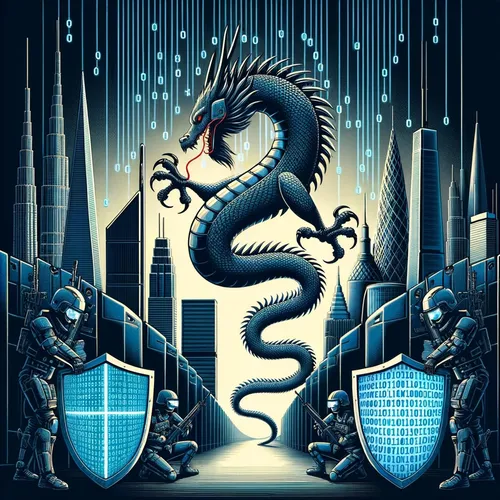Lip-Bu Tangled: China Hacks US Nukes, Pokes Microsoft & PLA Pandas Chomp Tech Bamboo
- Author
- Quiet. Please
- Published
- Fri 08 Aug 2025
- Episode Link
- https://www.spreaker.com/episode/lip-bu-tangled-china-hacks-us-nukes-pokes-microsoft-pla-pandas-chomp-tech-bamboo--67305738
This is your Dragon's Code: America Under Cyber Siege podcast.
Hello listeners, Ting here—your favorite cyber sleuth with a penchant for microwave noodles and digital fortress breaches! If you thought America’s infrastructure had a sleepy week, let me jolt you awake with Dragon’s Code: America Under Cyber Siege, covering the most sophisticated cyber ops launched by China in the last few days.
Let’s jump into the mayhem—starting with the US National Nuclear Security Administration. Yes, the agency handling America’s nuclear arsenal! Last month, Chinese state-backed hackers managed to slip into their networks, exploiting mismanaged passwords, unrestricted remote access, and weak IT/OT segmentation. The attack methodology was classic reconnaissance and privilege escalation, according to US security advisors, followed by credential harvesting via malware and lateral movement across network zones. It’s the kind of playbook the NSA’s digital defense team literally has nightmares about.
Over in the Microsoft ecosystem—which, if you listen to Roger Cressey, ex-White House cyber and counter-terrorism advisor, is practically Beijing’s playground—the plot thickens. Two major vulnerabilities were exposed in Microsoft’s SharePoint and Exchange server platforms. While the SharePoint zero-day is actively exploited, with malware dissected by CISA revealing credential theft tools and remote code execution modules, the fresh Exchange bug (a favorite for Chinese and Russian espionage) has put federal court systems, military supply chains, and infrastructure operators on red alert.
Why is Microsoft such a juicy target? Roger Cressey calls it “a $4 trillion monster”—because US government networks, critical infrastructure, and the military are saturated with its products. Chinese teams are so familiar with these wares, it’s like letting pandas roam the bamboo forest. Senator Tom Cotton literally fired off a letter to SecDef Pete Hegseth, grilling Microsoft about Chinese engineers maintaining US military cloud systems. Turns out, “digital escorts” meant to supervise these foreign techies often lack the skills to spot subtle sabotage.
Let’s talk attribution—it’s no longer digital fingerprints alone. According to the Department of Justice, Cadence Design Systems, led by Lip-Bu Tan, transferred sensitive chipmaking tech to China’s National University of Defense Technology (linked to the PLA), a classic supply chain compromise. Cotton says the evidence is now overwhelming: China is the biggest cyber threat to US infrastructure, with infiltration campaigns targeting everything from defense contractors to telecom networks.
Defensive measures? It’s catch-up mode. Following CISA’s advisory, agencies are rushing to encrypt credentials, deploy multi-factor authentication, and audit admin accounts. The FAA and TSA just pushed new cybersecurity standards for unmanned traffic systems, requiring NIST-based policies and continuous threat assessment—think zero trust, secure-by-design everything.
Cyber experts say the main lesson learned this week: complacency kills. Plaintext passwords and shared logins are invitations. Government officials are calling for firewall upgrades, software patching on a religious schedule, and a permanent end to trusting foreign tech engineers with military cloud secrets.
That’s all for my whirlwind tour of cyber shadows and electric dragons! Stay sharp, charge your passwords, and don’t let your servers sleep. Thanks for tuning in, and don’t forget to subscribe. This has been a quiet please production, for more check out quiet please dot ai.
For more http://www.quietplease.ai
Get the best deals https://amzn.to/3ODvOta
